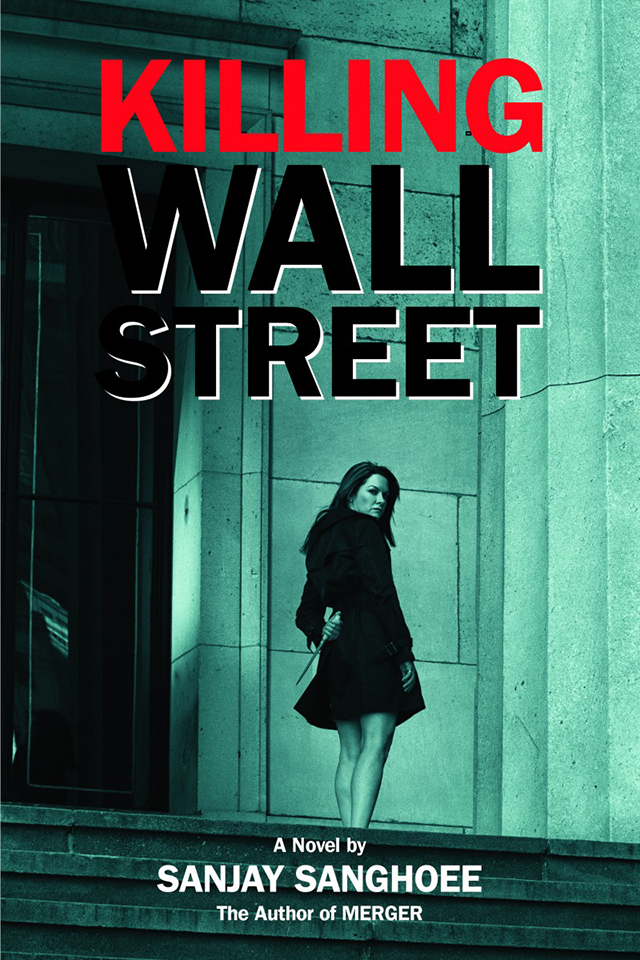
Sanjay Sanghoee’s second thriller, Killing Wall Street (Argo-Navis, May 2013), is a tour-de-force of vigilantism, murder, corporate intrigue, soap opera, action, and methodical police work. But that is all mainly for the entertainment value. The real theme of the novel is working class rage and the power of individuals to take on forces much larger than them, and in this respect it captures the spirit of the Occupy Wall Street movement.
As the title suggests, the book takes things to the extreme. In doing so, it skirts around satire but beneath the absurdities lies a bubbling cauldron of outrage at the irresponsibility and callousness of bankers, CEOs, corporate lawyers and the ilk who made such a royal mess of our economy in 2008, and who continue to exploit America even today.
It is ironic that Mr. Sanghoee, who is himself a banker, understands the sentiment behind the Occupy movement and the angst of ordinary citizens so well. His inside knowledge of finance certainly adds to the authenticity of the novel. Perhaps it is not a coincidence that Mr. Sanghoee is also an active political and business commentator who writes routinely about workers’ rights.No doubt inspired by the television show "Dexter" and the haunting Michael Douglas movie from 1993, "Falling Down," Killing Wall Street throws us from the start into the angst-ridden world of Cathy, a single mother who is going through a severe midlife crisis and financial trouble, and is being steadily pushed by her environment to some sort of explosive incident. That incident comes in the form of a brutal encounter with her abusive ex-lover — an arrogant investment banker — which results in his death.
Being a moral person, Cathy is wracked with guilt. Turning herself into the police would leave her teenage daughter destitute. But there is also something else, something indefinable nagging at her, and that is the strong conviction that what she did was right.
This then sets the tone for the remainder of our relationship with Cathy, who talks to us in first person and describes the transformation that she goes through with a mix of dark humor and painful introspection. Simply put, she comes to the conclusion that "certain people" (read: the corporate bad guys who create financial crises for the rest of us) need to be stopped from hurting others, and the only way to do that is to take them out of the equation completely.
Over the top? Definitely, but that is exactly what the author seems to be aiming for. The murders, though realistic and hard-hitting, are more an allegory for the extremely high level of anger Americans have felt against Wall Street recklessness than they are the central point of the novel. Some readers might disagree, but that is how I felt.
As Cathy goes down her naughty or nice list, picking off her victims in increasingly creative ways, an FBI agent named Michael Sands is given the unenviable task of investigating random killings (the hardest type to crack) by a random killer. It’s the ultimate puzzle and Michael is stumped. With nowhere else to go he concentrates on the victims, trying to find a common link. But is there a link? Without giving away too much, yes — and it’s a pretty disturbing one. The victims are all part of a vast conspiracy to strangle the working class of America, and the author’s knowledge of finance allows him to present the plot with credibility.
As I read the book, I was a little torn between Cathy’s narrative and the story of the FBI agent (told in third person), and I found myself looking for clues as to which was more important. But as the plot progressed, the links between the two — some subtle, some more obvious — became clear. As in any good thriller, the two characters have different arcs that head inexorably towards each other, and when they collide the payoff is exciting and satisfying.
One more thing to highlight about the story are the memorable victims – a racist credit card company CEO, an alcoholic insurance executive from Texas, a sleazy lawyer with an unhealthy obsession with his car — all of whom are fleshed out expertly and almost with a sense of glee. I can only imagine what the author’s personal experiences have been on Wall Street. But since real life has produced people like Dick Grasso and Bernie Madoff, I found the characters in the book to be believable.
Does Killing Wall Street finally tell us anything about ourselves and our future? Yes and no. The character of Cathy is clearly a powerful symbol of working class rage and midlife angst, but beyond that it’s hard to say whether Mr. Sanghoee believes things will get better or worse for the 99% society she represents. You don’t have to be an economist to recognize that our nation is turning into an oligarchy run by special interests, and that the power of the individual to affect change is declining as the system becomes bigger and more unforgiving.
And yet, technology has also made it possible for greater numbers of people to mobilize against oppression, and for movements like Occupy Wall Street to push for change. There is awareness, and there is hope, and perhaps tomorrow there will be more progress. In the meantime, we can root for Cathy as she refuses to be a victim and takes on her oppressors – even if we don’t agree with how she does it.
Som Chivukula is the founder and president of Eureka Communications and a former journalist from MSNBC.
3 WAYS TO SHOW YOUR SUPPORT
- Log in to post comments














